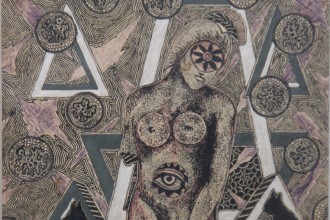I told her that I was a friend of her cousin Faiq and had come to spend a few days in Karachi. Then I asked her if I could, perhaps, come and visit her at her house. I asked her for her address and mentioned that I would drop by some evening after my return from Taxila.
“Tell me the day you want to come and give me your address,†she whispered. “I will have my brother come and pick you up.â€
This was the second and the last full sentence the girl uttered. I fished through my date book and gave her my address and the date on which I was scheduled to leave for Beirut.
I related the details of my meeting with Naima and her folks to Faiq. All he seemed to be interested in, though, was my comment that if he was looking for an Eastern wife he would not find a better girl than Naima, from east of Suez to Cambodia.
The poor man seemed even more overawed by the hotel than by me. It was probably the first time that he had set foot in it, and was feeling quite out of place in its plush, swank environment. I asked the waiter for a taxi and came out of the hotel with the youth in tow.
Throughout the ride I remained silent. I didn’t wish to embarrass my young companion further. He, on his part, preoccupied himself with giving directions to the cab driver. We passed through different parts of the city, each with its peculiar lifestyle. The faces, bodies, and garb of most of the pedestrians suggested that we were proceeding from affluence to poverty, from a world of plenty to a world of dire need. The women in Naima’s neighborhood flitted about in veils. Children, some barefoot, some with runny noses, romped around. Here and there along the street some people had set up cots on which they sat or lay. There were no foreigners.
Naima’s brother led me into a dull, pale building. We climbed several flights of dark, dank stairs and entered a flat on the third floor. I had to spend some time alone in the living room. In fact I had expected that and was mentally prepared for it. As I sat there waiting for my hosts to appear, I realized my mistake. I should have met these people immediately after my arrival in Pakistan, so that on a second visit around the time of my departure we would have become informal enough for me to gauge their true feelings, and to have some idea of their hopes and aspirations. It is amazing how a first meeting, no matter how protracted, almost never creates the same degree of informality as that generated by the interval between two short meetings.
The first to enter the room was Naima’s mother: middle-aged, sallow-complexioned, tolerably good-looking—I thought. Next came Naima’s sister. She looked more like a younger sister of the middle-aged lady, with nothing striking about her. The last to enter was Naima herself. She was truly stunning.
I had thought I would spend at most an hour with them. But I ended up spending the whole evening. By the time I got up to leave, I had become thoroughly acquainted with the entire family and its past life.
The hospitality started with fried snacks. Later, the older daughter, succumbing to the old lady’s persistent requests, sang a Mira bhajan for me, and Naima, again at her mother’s behest, played a cracked disc on the gramophone, to which I listened with feigned interest. I was also formally introduced to the photographs that hung from the wall. One of these, a picture in copper tones, shot most probably some time between 1930 and 1940 and printed on orthochromatic paper, was of the girls’ father. Like the occupants of the house, I, too, had to pick up the picture and look at it in reverent silence for a while before replacing it on the wall.




